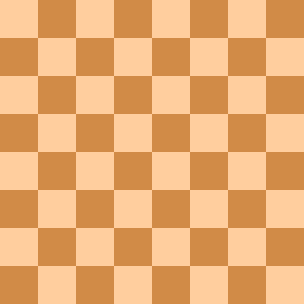Nightrider (chess)
A nightrider (also known as a knightmare or unicorn, though the latter sometimes also means the bishop+nightrider compound) is a fairy chess piece that can move any number of steps as a knight in the same direction. The nightrider is often represented by a symbol similar to the knight's icon, but altered in a way to indicate the additional straight-line motion.[1] In this article the nightrider is represented with an inverted knight, and notation N (in which case the knight is abbreviated as S for German Springer).
| a | b | c | d | e | f | g | h | ||
| 8 |  | 8 | |||||||
| 7 | 7 | ||||||||
| 6 | 6 | ||||||||
| 5 | 5 | ||||||||
| 4 | 4 | ||||||||
| 3 | 3 | ||||||||
| 2 | 2 | ||||||||
| 1 | 1 | ||||||||
| a | b | c | d | e | f | g | h | ||
The nightrider was invented by T. R. Dawson in 1925, and is often used in chess problems.
Movement
The nightrider moves any number of steps as a knight in the same direction. Intervening squares must be vacant. For example, a nightrider on b2 can reach square c4 and forward to d6 and e8, but cannot jump over the f4-pawn to reach h5.
Examples
British Chess Magazine (1925)
| a | b | c | d | e | f | g | h | ||
| 8 |  | 8 | |||||||
| 7 | 7 | ||||||||
| 6 | 6 | ||||||||
| 5 | 5 | ||||||||
| 4 | 4 | ||||||||
| 3 | 3 | ||||||||
| 2 | 2 | ||||||||
| 1 | 1 | ||||||||
| a | b | c | d | e | f | g | h | ||
The king together with two knights cannot win the endgame against a lone king (KSS vs. K), but the king together with a knight and a nightrider can win, because the knight cannot gain a tempo, but the nightrider can.
Solution: 1. Ne7! Ka7 2. Ng3 Ka8 3. Ne4 Ka7 4. Sb5+ Ka8 5. Nd2#
| a | b | c | d | e | f | g | h | ||
| 8 |  | 8 | |||||||
| 7 | 7 | ||||||||
| 6 | 6 | ||||||||
| 5 | 5 | ||||||||
| 4 | 4 | ||||||||
| 3 | 3 | ||||||||
| 2 | 2 | ||||||||
| 1 | 1 | ||||||||
| a | b | c | d | e | f | g | h | ||
With nightriders on the board, a mutual discovered perpetual check is possible.
A possible continuation would be: 1. Kd3+ Kc5+ 2. Kc3+ Kd5+ 3. Kd3+ Kc5+, etc.
| a | b | c | d | e | f | g | h | ||
| 8 |  | 8 | |||||||
| 7 | 7 | ||||||||
| 6 | 6 | ||||||||
| 5 | 5 | ||||||||
| 4 | 4 | ||||||||
| 3 | 3 | ||||||||
| 2 | 2 | ||||||||
| 1 | 1 | ||||||||
| a | b | c | d | e | f | g | h | ||
Nightriders can also participate in triple check.
References
Bibliography
- Hooper, David; Whyld, Kenneth (1992), The Oxford Companion to Chess (2nd ed.), Oxford University Press, ISBN 0-19-280049-3